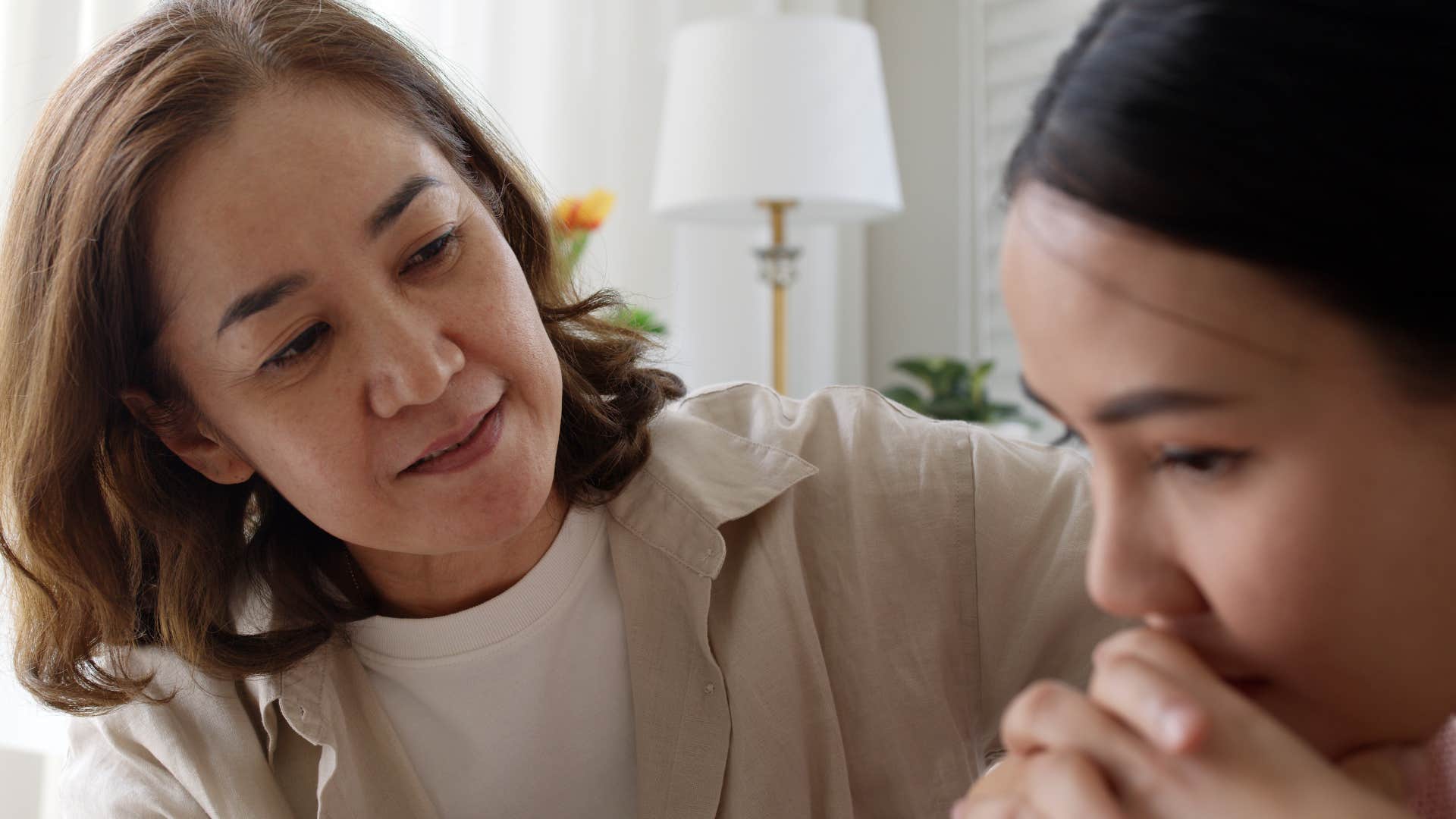People Who Only Visit Their Parents Out Of Obligation Always Do These 11 Things While They're There
Being "at home" with their parents doesn't feel like a safe place to land.
 fizkes | Shutterstock
fizkes | Shutterstock A lot of the tensions that adult children and their parents face are exacerbated by a lack of communication. They don’t know how to ask for what they want or express their concerns, so they end up operating from a place of resentment and frustration. When they do spend time together, that tension and their own resentment seep through in both small and large ways.
Many of these family dynamics are originally cultivated by parental guilt-trips. Even if their behaviors result in more time spent with their adult kids, it often comes at the expense of their emotional connection, trust, and bond, like family therapist Sarah Epstein argues. People who only visit their parents out of obligation always do these things while they’re there, but it’s not always because of tension or mistrust; rather, it’s the consequences of their parents’ struggle with natural disconnect.
People who only visit their parents out of obligation always do these 11 things while they’re there
1. They make excuses to leave the house
 MAYA LAB | Shutterstock
MAYA LAB | Shutterstock
Whether it’s masquerading their avoidant tendencies with an offer to run to the store or help with an errand, an adult child who only visits their parents out of obligation is always looking for an excuse to leave. Even if it’s a lack of emotional regulation themselves, rather than a shared relationship issue, they struggle to address concerns and tension in the moment.
Of course, according to a study from the Journal of Child and Psychology and Psychiatry, avoidant behaviors are often rooted in low self-esteem and childhood trauma. So, escaping from their parents and wanting to avoid conflict at home is actually rooted in how their parents raised them and dealt with tension earlier in life. It’s all connected, whether it’s obvious in the moment or not.
2. They talk about surface-level things
 imtmphoto | Shutterstock
imtmphoto | Shutterstock
If they struggle to have a vulnerable relationship with their parents and only visit them out of obligation — on birthdays, holidays, or when they’ve been guilted into quality time — adult children will only talk about “safe” topics. Whether it’s work, their daily routine, or gossip, they’re always lingering on the surface level
Like psychology expert Peg Streep explains, disagreements over life choices and a lack of strong boundaries can all contribute to this disconnection between parents and their adult children. Of course, they don’t want to dive deeper if they feel like they’re going to be judged or immediately disrespected.
3. They live out of their suitcase
 Nomad_Soul | Shutterstock
Nomad_Soul | Shutterstock
If they’re visiting for a weekend or making their stay short, an adult child who’s only visiting their parents out of obligation will always live out of their suitcase. It might seem harmless to some, but it’s a literal and metaphorical way for them to protect themselves — a reminder that they’re simply passing through, not making themselves “at home.”
Especially for adult children who struggle with “regressing” back into old habits and misguided mentalities around their parents, this simple suitcase habit creates a boundary. They’re not moving back in — they have their own sense of autonomy, and they can create space without putting their mental health or stability at risk.
4. They spend most of their time in a separate room
 Rawpixel.com | Shutterstock
Rawpixel.com | Shutterstock
People who only visit their parents out of obligation only ever show up for the actually obligatory meetings as well. When they’re not at the event they came for or having meals together, they’re figuring out ways to create distance to protect themselves and self-soothe.
Whether it’s going to bed early and waking up before everyone else is up, or choosing a room on a separate floor from the rest of their family, they are always trying to create distance — both on a literal and emotional level.
5. They sleep a lot
 Lysenko Andrii | Shutterstock
Lysenko Andrii | Shutterstock
According to counselor Stephanie A. Sarkis, emotional exhaustion is one of the most common side effects of being around a toxic person or entertaining a toxic relationship. Even if it’s in response to struggles with healthy communication or dealing with deep-rooted resentment, these moments of “quality” time can often quickly fatigue everyone involved.
That’s why people who only visit their parents out of obligation often sleep more than they normally would. They may not be physically tired, but when they’re around their parents, who tend to drain them in more ways than one, they cope emotionally by resorting to avoidance and rest.
6. They bring someone with them
 BearFotos | Shutterstock
BearFotos | Shutterstock
Whether it’s a partner or a friend, people who only visit their parents out of obligation always find an excuse to bring someone with them. Whether they’re meant to be a buffer against interactions with their parents or a pillar of comfort in a “home” they don’t feel secure within, they help to manage a lot of the inner turmoil that comes from family time when they’re not close.
Especially if there’s turmoil between parents and adult children about life choices, success, and their stability in adulthood — many of which affect parents differently and emotionally depending on the situation — having a person around who understands and supports their lifestyle can be grounding.
7. They need to decompress for hours
 Giulio_Fornasar | Shutterstock
Giulio_Fornasar | Shutterstock
According to psychologist Michele Leno, many people use distractions as a way to cope with stress and emotional strain, especially when they don’t have the emotional regulation skills or positive self-soothing mechanisms to truly deal with them in the present moment. For some people, it’s mindless entertainment and doomscrolling; for others, it’s escaping into sleep and rest.
Especially if they’ve been anticipating and anxiously awaiting the obligation of returning home, the second they do get home and spend time with their parents, adult children may need time to decompress. They’ve handled the part they were likely most anxious about, and now their nervous system is trying to catch up.
8. They’re always working
 simona pilolla 2 | Shutterstock
simona pilolla 2 | Shutterstock
Especially if their parents put a lot of emphasis on their success and care a lot about their career, adult children lean on work to escape from tension and resentment when they’re at home. If it’s the only way they can find a bit of peace and solitude, they’re pulling out their laptop, sending emails, and doing whatever they can to self-soothe.
Of course, many family dynamics aren’t entirely toxic, only uncomfortable and disconnected. So, it’s not always an escapism route from manipulation or toxicity, but rather sheer discomfort, guilt, or anxiety.
9. They leave early
 Miljan Zivkovic | Shutterstock
Miljan Zivkovic | Shutterstock
If adult children are only visiting their parents out of obligation or because they’ve been guilted into coming over, chances are they’re only going to stick around for the bare minimum amount of time. They’re not interested in tacking on an extra sleepover or making future plans, likely because the relationship they share doesn’t feel like a safe, happy, and comfortable place to land.
Whether it’s childhood trauma gone unaddressed or lingering resentment about disrespect, there are so many reasons why an adult child may want to spend the least amount of time possible at home.
10. They actively avoid eye contact
 Chay_Tee | Shutterstock
Chay_Tee | Shutterstock
Eye contact is an incredibly powerful nonverbal tool, often used to add value and connection to seemingly surface-level conversations. When we make a point of maintaining it, we’re not only reminding people that we’re actively listening, we’re forming a strong, trusting bond with them.
Of course, some people struggle with eye contact due to anxiety, but in other cases, avoiding it serves to self-soothe their own unique emotional turmoil. If an adult child is visiting their parents out of obligation and trying their best to maintain boundaries in conversation, disconnecting themselves with these nonverbal actions can be a tool to protect their own sanity and stability.
11. They redirect conversations
 winnievinzence | Shutterstock
winnievinzence | Shutterstock
Whether it’s overlooking pockets of vulnerability or shifting away from topics that tend to spark conflict with their parents, people who only visit their parents out of obligation always redirect conversations to protect the peace. They don’t want to get into the depths of an argument or open up a can of worms — they want to get in and get out.
Of course, communication skills play a large role in how parents and their adult children form a connection. If their parents aren’t willing to listen, adult kids aren’t willing to express grace, and the pair of them avoid conflict. Of course, their relationship will never be ready to tackle the bigger, more emotional topics.
Zayda Slabbekoorn is a senior editorial strategist with a bachelor’s degree in social relations & policy and gender studies who focuses on psychology, relationships, self-help, and human interest stories.

